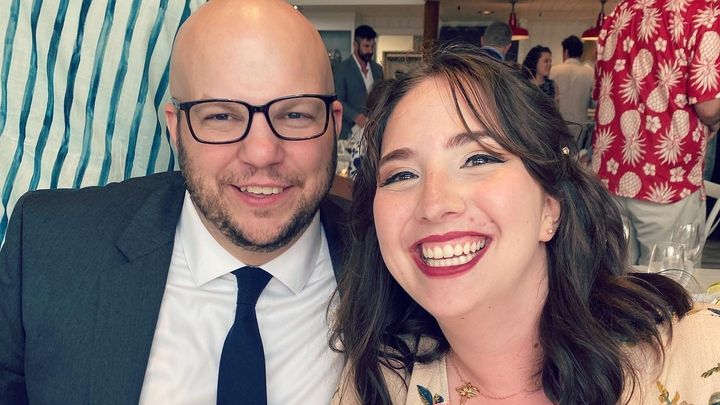
Relieve Sarah and Philip's Medical Burden
Donation protected
We're bad at asking for help, so please understand that the fact that we are reaching out for help means we REALLY need your help.
Eliminating our medical debt would be a good step toward getting what we need
to take care of ourselves.
-
In October 2017, Sarah began having seizures.
Some are epileptic, and some are triggered when her autonomic nervous system is overwhelmed.
This happens often, because her nervous system is easily overwhelmed.
One neurologist described it as if her nervous system is 10 times more sensitive than most. So Sarah experiences everything 10 times more powerfully.
She's a super taster, and a super smeller.
This means she can't handle spicy foods
at all.
It also means she feels pain 10 times more powerfully.
Your autonomic nervous system (ANS) controls involuntary bodily functions, like heart rate, blood pressure, respiration, and digestion.
Sarah's ANS sucks. It's slow and erratic.
One cardiologist explained that when you stand up quickly, for example, your ANS is responsible for relaying information throughout your body. In response, your heart and lungs adjust to the effort, and maintain the new normal.
When Sarah stands up too quickly, however, her ANS doesn't relay the information quickly enough, which can make her dizzy and foggy.
Sometimes this makes her pass out,
or have a seizure.
Unfortunately, while cardiology focuses on the heart, and neurology focuses on the brain, there is no field that focuses on the ANS.
It's a vague, grey area.
A crack to fall into.
This is why no one has been able to offer much help.
ER visits for crippling symptoms lead to all kinds of tests, but the results always come back normal
because the tests only check that the individual organs are each in working order.
They cannot check how they interact with each other - the ANS.
And that's where the problem lies.
When Sarah has a seizure, she loses consciousness.
She convulses, sometimes so wildly she throws herself off the bed.
When she regains consciousness, she has a migraine and is exhausted.
Sometimes she doesn't remember what year it is, where she lives, or who her family is.
Sometimes she doesn't remember Philip and needs to be convinced he hasn't kidnapped her.
Sometimes she's unable to speak.
Sometimes she can't move anything except her eyes, and Philip has to ask yes (look right) or no (look left) questions until he figures out that she needs him to give her a puff of her inhaler because she's struggling to breath and is about to have a panic attack.
Sometimes these effects last several hours.
Sarah's had hundreds of seizures in the last 7 years. (Probably over a thousand.)
They often happen in waves. She'll sometimes go a few months with only a couple, then have several in a week.
It's only getting worse.
Earlier this year, she was having 3-5 seizures per day,
every single day,
for over 2 months straight.
Even this is only the tip of the tip of the iceberg's tip.
There's also Sarah's ADHD, her PTSD, and her anxiety, bipolar, and panic disorders, her chronic pain and illnesses, her sleep apnea, and her (possible) narcolepsy with cataplexy,
as well as Philip's bipolar disorder, sleep apnea, and (probable) autism.
As her occupational therapist (OT) describes it, when doing any task Sarah has to work 10 times harder than the average person in order to maintain her health.
A couple of hours out of the house can take a couple of days to recover from.
Her OT says the amount of energy Sarah puts into her health is equivalent to a full time job of its own.
Sarah hasn't been able to work a full time job (or even most part time jobs) for 7 years.
She's been appealing her disability application for 2 years.
Her disability attorney (DA) told us that her application will be accepted eventually,
but that the government will simply reject every submission for the first 3 years.
They said that's just how the system "works."
Countless doctor's appointments, emergency room visits, medical devices, and medications have really added up.
So has the list of broken things
we wish we could fix.
This is our 2nd summer (so far) without AC.
(Luckily it's just the hottest 2 on record.)
Sometimes, we've had to put gas on a credit card
so Philip could go to work.
A lot has fallen on Philip's shoulders.
He's filled every hour with work, and there's still not enough money coming in.
When he's not working, he's taking care of Sarah.
Sometimes he has to help her walk to the bed
or to the bathroom
or back to the bed.
Stairs are a legitimate risk.
Time spent taking care of Sarah
is time Philip cannot spend earning money
so the debt grows.
The stress has had negative effects on Philip's health.
He now gets panic attacks, and we worry about the strain on his heart.
His mental health is at an all time low.
Without help, Philip doesn't think he could survive another winter.
-
Thank you for reading this.
Whether or not you can help financially, we appreciate your willingness to listen.
It's difficult to condense 7 years of struggle.
There's no giant problem to point at,
to fix.
It's death by a thousand cuts.
Each blow making our lives
just a little bit harder.
But just a little bit.
Not enough for us to speak up
just enough for it to add up.
But we're going to try to show you what our life has become.
To show you the weight we are being crushed by.
To make invisible disabilities visible.
So maybe
you can show us
how you can help.
If nothing else, we want to be seen.
- Philip & Sarah
Co-organizers (2)
Philip Simondet
Organizer
Minneapolis, MN
Sarah Arnold-Simondet
Co-organizer